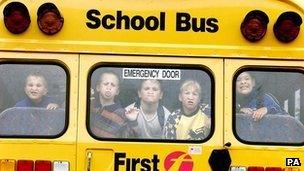School transport: Many councils 'making cuts'
- Published
- comments

US-style school buses are used in some areas of England
Almost three-quarters of England's councils are reviewing or making cuts to optional school transport services, data suggests.
The English figures cover 81 local education authorities outside London and the six big metropolitan areas.
They were obtained through a Freedom of Information request by the Campaign for Better Transport (CBT).
The government said an extra 拢10m was being made available for rural community transport.
The CBT inquiry was prompted by reports of school buses being axed across England.
Local authorities are obliged to provide free school transport for pupils aged between five and 16 years old if their nearest school is more than three miles away. This goes down to two miles for under-eights.
Subsidised fares
Children will special educational needs and some from low-income families also get some statutory assistance.
But councils also provide school transport on a discretionary basis, which is especially valued in rural areas.
Most of this is provided in the form of a school bus, but some children are offered subsidised rail fares.
The CBT said 38% of councils were reviewing or cutting transport to faith schools and 46% were reviewing or cutting transport to schools other than faith schools.
Meanwhile, 51% were reviewing or cutting post-16 transport.
In total, 72% were reviewing or cutting one or more areas of school transport.
CBT bus campaigner Sophie Allen said: "School buses are vital to reduce congestion and pollution, especially at peak times. In some areas, parents could have to walk almost three miles each way, twice a day, just to get their children to school.
"Parents able to drive instead will add to traffic problems, but for the quarter of households who do not have a car this will not be an option."
The campaign pointed to councils reducing their transport services back to the statutory minimum in areas such as Surrey and Durham.
The CBT said it was calling on the government to give councils extra funding to ensure that children could get to school safely and working parents were not unfairly forced to give up work.
'Parents struggling'
Shadow transport secretary Maria Eagle said: "The scale of cuts to local bus services has left many parents struggling to afford the extra costs of driving their children to school or to juggle work with doing the school run.
"The risk with these bus cuts is that many parents who cannot afford to drive are being forced to let their children walk along routes to school that are far too dangerous, compromising child safety."
In September, a group of charities and teaching unions wrote an open letter to Education Secretary Michael Gove expressing concerns about the cuts to school transport.
A Department for Education spokesman said: "Local authorities already have a legal duty to provide free school transport for pupils to attend their nearest suitable school, provided the school is beyond the statutory walking distances.
"We recently announced funding of 拢85m to fund extended rights to school travel for pupils from low-income families.
"The Department for Transport has also protected the concessionary travel scheme in full and provided 拢10m extra funding for community transport in rural areas."
- Published1 December 2011
- Published22 July 2010
- Published3 February 2011